Whether the death is sudden or expected, losing a loved one is a uniquely challenging experience. If not dealt with in the right way, grief can have dire consequences such as depression, anxiety or substance abuse. In this article, we’ll discuss how to cope with grief as well as outline the stages of grief and loss.
How To Deal With Grief
- Prioritize Self Care
In the face of grief, many people neglect their own needs like showering, eating or sleeping. Don’t neglect your own self care. Getting a full night’s sleep, eating regular, nutritious meals and staying on top of your hygiene can make a big difference in your grief recovery process. Hold yourself to a routine and plan activities that will boost your mood, even if it’s just baking cookies or going on a walk to get some fresh air.
- Lean on Others
You don’t have to go through this loss alone. Whether you seek out the support of a trusted friend or family member, a support group or a professional, other people can help you work through your grief in a way that feels less isolating. Even if you don’t want to discuss your grief with others, simply socializing and maintaining connections is beneficial for your mental health when you’re struggling after loss. There is no shame in needing additional support. If you’re needing help processing grief, a grief therapist may help you cope.
- Express Your Feelings
Trying to bury your grief will just draw out the grieving process. Allow yourself to write letters to the deceased, share memories of them or meditate. These activities can all help you make sense of how you’re feeling and help you move forward.
- Use Books as a Guide
If you’re having trouble processing your grief, the good news is that you’re not the first. Many others have experienced heartbreaking losses and written books about them to offer comfort and guidance to others going through the same thing. Consider checking out some books on dealing with grief, such as Option B: Facing Adversity, Building Resilience, and Finding Joy by Sheryl Sandberg and Adam Grant, It’s OK That You’re Not OK: Meeting Grief and Loss in a Culture That Doesn’t Understand, by Megan Devine, or A Grief Observed by C.S. Lewis.
- Give Yourself Time
There’s no set schedule for how long it takes to go through the grief cycle. Understand that everyone’s grief will look different, and however long it takes you to process is ok.
Stages of Grief
There are several models of grief, one of the most notable being the seven stages of grief. Not everyone will go through every stage of grief, and the stages won’t necessarily occur in order. But these phases of grief help us understand the natural process of grieving and what to expect in handling a loss:
- Shock and Denial
When we hear that someone we care about has died, it’s natural to react with disbelief. We might convince ourselves that our loved one will eventually return or that we can see or hear them.
- Pain and Guilt
Once the shock has dissipated and the death finally seems real, the pain of the loss truly sets in. It’s important to allow yourself to feel these uncomfortable emotions rather than try to escape them. In addition to the pain, you may experience guilt over things you did or didn’t do with your loved one and may even experience survivor’s guilt about outliving them.
- Bargaining
The agony you feel can be so excruciating that you feel willing to do anything to stop the pain. This is where the bargaining stage comes into play. When we feel helpless, we look to a higher power in hopes that if we do something different, we can bring the deceased back. This allows us to feel like we have some sense of control over the situation.
- Depression
Depression often hits once you come to the realization that bargaining is not an option. Signs of depression include feeling numb or hopeless, withdrawing from others, crying, excessive sleep and low energy. During this stage, try not to isolate yourself from loved ones or make harsh judgements about yourself.
- The Upward Turn
The fifth stage is like the rainbow after a storm. Your pain will slowly begin to alleviate and life will seem a little more bearable as you adjust to a world without the deceased.
- Reconstruction
In the reconstruction stage, you’ll begin putting back together the pieces of your life. You may start to look ahead to the future and make new goals, feeling inspired and determined despite the loss you’ve endured.
- Acceptance and Hope
The last of the seven stages of grief, this is the point at which you move forward. Thinking or talking about the deceased won’t be so painful. Just because you’re healing doesn’t mean you’ll never feel sad about the loss again. However, you might now be able to look back on memories and feel happy about the time you had together.
Whole Life Insurance From Americo Senior Life
Having uncomfortable thoughts about your own mortality is a common response to losing someone close to you. If you don’t yet have whole life insurance, Americo Senior Life can help you obtain an affordable life insurance policy that meets your needs and provides coverage if the unexpected happens. Specializing in senior life insurance, our flexible plans are tailored to meet your needs and your budget. Go online today for your free life insurance quote or visit our resources page for more helpful tips.
